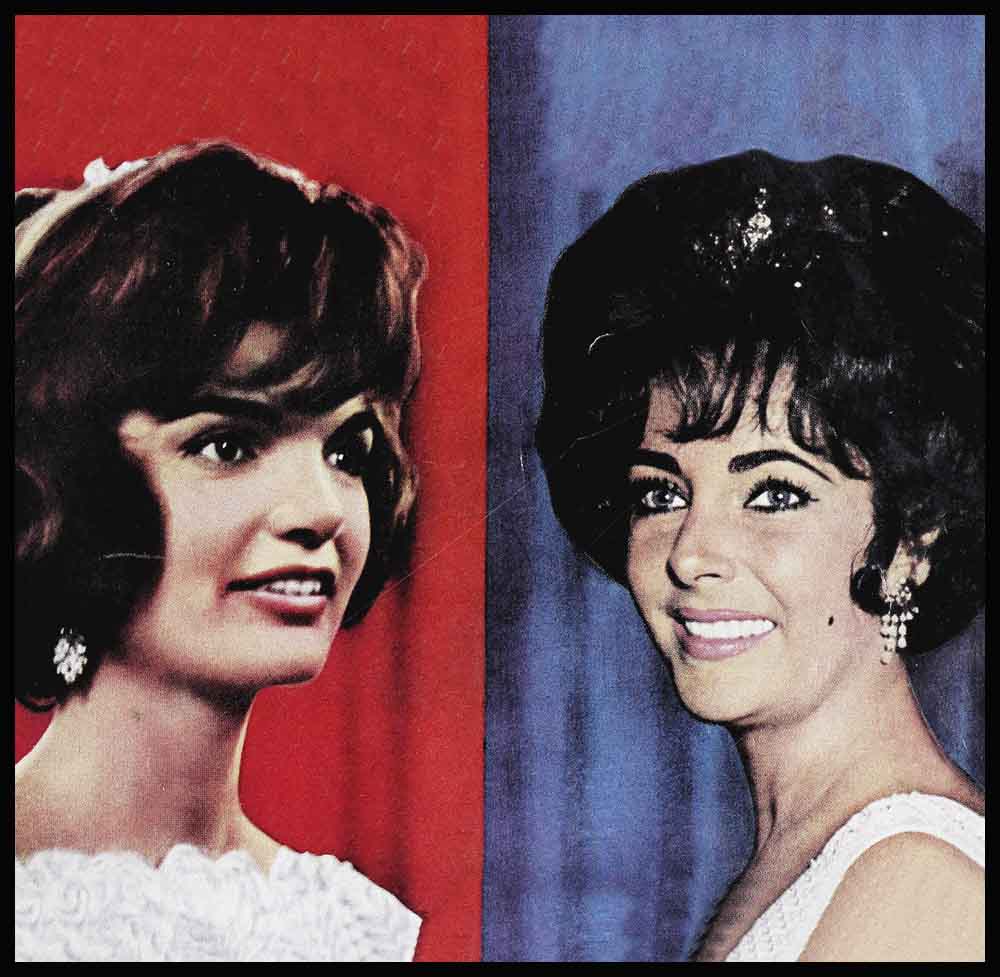
America’s 2 Queens!
Everything that America’s two reigning queens do, makes news. And some days, the headlines heralding the latest activities of Queen Elizabeth and Queen Jacqueline are so similar that for a moment they blur over the fact that these two lovely women are as different as pizza and beer from haute cuisine and vintage wines. Yet strike out one name and put in the other, and nobody’d be surprised: Jackie Visits New York Dress Shop . . . Liz on 20G Buying Spree in Paris . . . Jackie Postpones Trip to India Ten Days for Sinus Treatment . . . Liz in Hospital Again (‘Food-poisoning’) . . . Jackie Jetting to Rome . . . Liz, Eddie Off to Italy . . . Dazzling Jackie Conquers Romans . . . Triumph for Liz Taylor (She came, she was seen and she conquered Rome) . . . New Delhi Throngs Cheer Jackie, ‘Rani of America’ . . . Queen Liz Wins Italy’s Oscar—Cheering Fans Mob Her!
But then there were those other headlines, the ones that have made Liz both famous and infamous—and which could never apply to Jackie Kennedy: Liz and Husband Split—It’s Burton . . . Liz in Hiding! Rift Denied! . . . and all the others. Scare headlines; trouble and scandal headlines. What lies behind them—the headlines about Queen Elizabeth and the ones about Queen Jacqueline?
What is it like to be Elizabeth Taylor, queen of the box-office; queen of the magazine covers (a co-queen, actually, sharing the honors with Queen Jacqueline); queen of Rome and ruler of Italy—until Jacqueline arrived on the scene briefly and took the spotlight away from her? Among the royal visitors who have made pilgrimages to pay homage to Queen Elizabeth Taylor have been the King and Queen of Greece, the Infanta of Spain and President Sukarno of Indonesia. Above all, what is it like to be Liz Taylor the woman?
What is it like to be Queen Jacqueline, queen of fashions (selected as the best-dressed woman in the world for the second consecutive year by 2,000 style experts who compared her to Helen of Troy, Marie Antoinette, and Mesdames de Pompadour and du Barry) ; queen of popularity (the new pin-up favorite of the Armed Forces) ; queen to her relatives and friends (her sister-in-law actually calls her “The Queen,” and author Ludwig Bemelmans declares, “She’s the Cleopatra of the Potomac”); wife of a world-famous man and the new undisputed queen of the television screen? Above all, what is it like to be Jackie Kennedy the woman?
Let’s pretend that through the magic of imagination you are able to really be Jackie and really be Liz. What would you do? How would you feel? Let’s try it! Let’s go! Alakazam. . . .
You re Jackie Kennedy—home at last after a quick trip to Italy and a nine-day visit to India. Already the highlights of your tour have fused into a kaleidoscope of wonderful memories: your stay at a Renaissance palace in Rome . . . your audience with Pope John XXIII, who told you that he thought Caroline was a beautiful name . . . your arrival in New Delhi, where more than 100.000 Indians hailed you as “the Queen of America,” and “the American Maharani” . . . your placing of a wreath of white roses on the spot where Mohandas K. Gandhi, India’s great leader, was cremated fourteen years ago . . . your visit to children’s hospitals, where you passed out lollipops to the youngsters and one big-eyed little girl reminded you so much of Caroline!
But now all that is past. You’re swept up in the familiar whirl of the present.
It’s early in the morning when your day begins. While you’re slipping into a simple dress (no collar, no sleeves, high neck and slim skirt) Caroline, still in pajamas, is entertaining your husband as he shaves. You smile contentedly as you hear her bubbling chatter and his answering laughter. Although Caroline has already eaten with her brother in the nursery, she hangs around, pouring out the non-stop information about her pets, while you and your husband breakfast.
Your husband hoists up his daughter and hugs her, then he kisses you and goes off to work. After he leaves, you take Caroline’s tiny hand in yours and go to her pink-and-white bedroom. There little Fitz, one and three-quarter-years of rocket energy, is moving around as fast as his chubby little legs can propel him. To dress him, you have to catch him first, and his brown thatch of hair jiggles up and down, his dark eyes sparkle mischievously as he crawls and scrambles out of your way.
Caroline, a blonde and blue-eyed young lady, tries to act as if she’s above the battle, but just as you think you have her brother cornered, he wiggles under the bed, and from Caroline’s most unladylike giggle, it’s easy to see whose side she’s on.
You get down on your knees, peek under the bed, and say, “Nam kya hye.” (These are the words Mrs. Indari Gandhi, Nehru’s daughter, taught you when you asked her how to ask a child’s name.) Your son doesn’t reply. Your daughter answers for him. “His name is John Fitzgerald, Jr.— silly!” But the Indian words have a magical effect—Fitz does crawl out and you corral him.
Somehow you get them both washed and dressed. You hand your son over to Maud Shaw, his nurse, and then you take Caroline upstairs to her play-group, where she can romp with twelve of her small friends.
Oh, oh, you’ve forgotten something, Caroline reminds you, and you return to her room. The morning ritual: as important as seeing that Caroline brushes her teeth and combs her hair. Robin. It’s time to take the cover off Robin’s cage. This “Robin” business is a bit confusing. Robin’s really a canary, but Caroline’s crazy about robins, so the canary is officially Robin.
Now that Robin has been unveiled and fed, it’s time to check on the others—the two turtles, “Turtle” and “Tortoise,” the Welsh terrier, “Charlie;” and the cat, “Tom Kitten.” A quick look out the window shows you that the other important member of the menagerie—“Macaroni,” the brown and white pony—is contentedly munching the White House grass in the area south of your husband’s office.
Your daughter’s concern for her pets is matched only by your own concern for all animals. When you went to India, your own choices as gifts to the Indian government were two buffalo cows, two bisons, two whistling swans, one bear, two coyotes, two possums, two pumas, two Virginian deer, two raccoons, two porcupines, two foxes, one bobcat and one paca. A cargo plane load of animals, but no monkeys. Wouldn’t have been fair to Caroline, somehow, to send a monkey out of the country. Not after that question she’d asked on meeting astronaut John H. Glenn, Jr. “Where’s the monkey?” she’d inquired, referring to Enos the space chimpanzee. And Glenn had replied, “He’s eating bananas.”
But now all of Caroline’s pets have been accounted for, and it’s time to escort her upstairs.
For the next hour you will be free—the only time you’ll have completely to yourself all day—and you plan to take a walk or play tennis. But for the moment, even though it’s not much past eight in the morning, you must make a few phone calls to your aides.
As you lift up the receiver, the mirrors in the room reflect back your image: jet black hair, full exotic lips, heavily lashed green eyes; widely spaced and high, almost Oriental, cheek bones. If you notice your reflection at all, it is only to laugh at yourself as you recall Paris Presse columnist Louis Foy’s suggestion that Congress should pass a law replacing all pictures of G. Washington with yours. . . .
You re Elizabeth Taylor. It’s still dark in the bedroom of your fourteen-room villa on Via Appia Pignatelli when the alarm rings before 6 A.M. You want to shut it off and sleep until noon, as you so happily were able to in the years B.C. (Before Cleopatra), but you can’t. This is another working day for you, a typical day, and you must get up right away.
Promptly at 7 A.M. you sit down to eat a big breakfast with the kids. Daughter Liza, three, and sons Michael and Christopher, eight and six, chatter away as you eat. Little Maria, one-and-three quarter-years old, the handicapped German child you and Eddie recently adopted, is still sleeping peacefully in her crib.
You’re hungry this morning, so you have dollar pancakes, hashed-brown potatoes, eggs Benedict, sausages, waffles, kippers and coffee. (At other times, when your weight is giving you trouble, you diet by starving. (“Coffee for breakfast, scrambled eggs for lunch and steak for supper—with grapefruit coming out of my ears.”) But today weight’s no problem, and you eat!
Time for work. You kiss your children goodbye and send them off to school. (It’s ironical that here in Rome. Liza attends a special American school where one of her classmates used to be Miss Kate Burton, daughter of Richard Burton. He’s the same Richard Burton who is your co-star in “Cleopatra” and with whom your name is scandalously linked.
At the door you realize you’ve forgotten something. You go back to say goodbye to the others: Rocky, the St. Bernard; Lolita and Humbert, the Yorkshire terriers; Teresa, the Scotch terrier; Brigitte and Alexandre, the Persian-Siamese cats; Perry and Giacondo, the lion cubs. Then you are off to the studio. . . .
Jackie’s new friend—the camera
Back in Washington, you’re getting piles of fan mail like any movie star. More, maybe, ever since forty-six million people joined you on the recent TV “Tour of the White House with Mrs. John F. Kennedy.” Even Caroline gets 400 letters a week. Some of your answers—and hers—you write yourself; others you dictate to your personal secretary.
This morning you also check the menu for tonight’s formal State dinner. Everything, from seating plan to flower arrangements, must be perfect. You consult with the head usher, then go over your afternoon schedule with your social secretary. Your press secretary brings you late newspaper clippings and you laugh over a columnist’s reference to your son as “Irving.” It’s the nickname a photographer tacked on Fitz when, like most new-borns, he was no beauty. . . . This item will go into one of the big scrapbooks that make up a personal history of your years in the White House—along with the one quoting your dry comment as you showed off Abraham Lincoln’s bed on the TV tour. (“Every President seemed to love it.”)
There’s one whole scrapbook on the tour alone: comments like, “For the first time, JFK called his wife ‘Jackie’ during his brief appearance at the program’s end.” . . . and Walter Winchell’s paragraph, “New Yorkers are Talking About: Jacqueline Kennedy’s pretty movie-starlet face and debutante figure (and little girl’s voice). . . . An infectious smile, stage presence, poise and even showmanship. Until her husband comes onstage and she gets tense.” . . . columnist Jack O’Brian’s observation: “She sounded like an intellectual Marilyn Monroe.”
Suddenly you leave your desk and walk over to the window. Outside, all Washington lies at your feet. But you don’t see the historic buildings or the magnificent scenery—only a baby buggy. John, Jr. is sitting up in it, and the top is down. Caroline is pushing, and the expression on her face is familiar. Of course! It’s your own expression—amused, proud, concerned, motherly. Caroline is imitating you. Fitz is her baby. (But not just her’s. Once she had proudly told inquiring reporters: “He’s the President’s son—and I’m his sister.”)
But it’s too nice to stay indoors. You tie a babushka around your hair (at one time or another, the papers have attacked you for wearing such a scarf and for allowing yourself to be photographed in a bathing suit and for having some skirts that exposed your kneecaps and for going to church in sandals and without stockings and for liking slacks), and go out to be with your children.
Caroline asks, “Is daddy coming home for lunch?”
You look at your watch, realize it’s late, tell your daughter you don’t know, Daddy may be too busy today, and hustle your brood inside. Your outing is over. . . .
Back in Rome, you’re Liz again.
As soon as you arrive on the set, eyes are on you. They follow closely as you hurry to your special four-room cottage that the studio built for you at a cost of $100.000. Eyes watch as you take your place on a kind of conveyor belt that transforms you from Elizabeth Taylor into Queen Cleopatra: a long, torturous makeup process, a costume to be squeezed into, a hot heavy wig placed on your head.
You’re ready for the cameras. Now, as Richard Burton—Marc Antony—walks toward you, the eyes are even more probing, questioning . . . piercing . . . accusing . . . reading scandalous significance into your every word, expression, gesture.
The bright lights go on and the cameras whirr. The baleful red eye wheels in close to you. But this, the familiar camera’s eye, is a welcome relief. It shuts out those frightening human eyes.
After a time the red eye blinks off and the lights go out. Shooting is over for the morning. You walk off the set still feeling the eyes stabbing into your back.
You pass a gilt throne in the corner of the studio, hidden behind a pile of flats and props. But you don’t bother to slow down at your once favorite hideaway—a sort of adult, miniature, private Disneyland. A few months ago you’d have playfully pushed Eddie down on the throne, placed a wreath of artificial laurel leaves on his head and then plopped into his lap. And the rest of the world would have been non-existent. But Eddie isn’t here now.
So now you hurry to your cottage. The rest of the world refuses to be shut out. There are always the papers—Italian and American—with their attacks, speculations, predictions.
You remember how you and Eddie ate corned beef flown in from Max Asnas’ Stage Delicatessen in New York and drank beer delivered from an Italian grocery nearby, you talked about this morning’s scenes and this afternoon’s scenes.
How Eddie took a nap on the bed while you went into the huge bathroom decorated with imported, hand-painted tiles and ran a tub. You took off your costume, slid into the hot suds and closed your eyes. The tensions and pressures dissolved into warmth and peace. The memory of those other eyes faded . . . You could rest a while. . . .
In Washington, it’s mid-afternoon. You—Jackie Kennedy now—are on the White House lawn, pushing John, Jr. on a little swing . . . pretending to be amazed as Caroline peers down from the top of her Jungle Gym. You rescue Fitz when he stuffs a handful of sand in his mouth. You help boost Caroline into her tree house.
Finally, you and Caroline leave the baby with his nurse, and go pick some flowers. Then the two of you go into the house, where you set up an easel for Caroline and open a sketch book for yourself. You sketch a country house, or a harlequin or a ballet dancer. Or a Street scene, which is Jack’s favorite subject. Caroline paints flowers.
Late in the afternoon, after you’ve taken time out to visit a children’s hospital, Caroline’s water-color painting is already dry. When Jack comes home at cocktail time, you both await his reaction to the painting.
Once you played a trick on your husband. You took one of Caroline’s finger paintings (the best work of her Smudge Period), framed it carefully and put it in the center of the room where he would surely see it.
He did. He asked who painted it.
Bill Walton, you told him. Then added that it was priced at $600. What do you think of it? you asked.
Jack scratched his head for a second and then blurted out, “Good Lord, what kick is Walton on now?”
But tonight there is no trick, and his reaction is direct and enthusiastic. The flowers look like flowers. All this art reminds you of the time Perry Wolff, shaping up the TV White House tour, asked if your husband was really all that interested in art. No, you’d admitted, not quite. But hastily added that he was awfully fond of music. Wolff’s eyes had brightened with a new idea. Did your husband have a favorite song?
Yes, several, you’d nodded. “But I must admit he has one special favorite, lately,” you’d said.
“What’s that?” asked Wolff eagerly, hot on a scoop.
“ ‘Hail to the Chief,’ ” you replied, trying to keep a straight face.
But Bill Walton knew what he was talking about when he once said of you . . she spends more time with her children than most mothers I know. You go to dinner and Caroline is always there in her pajamas, waiting for the President.”
Tonight is no exception, except it’s for cocktails Caroline is joining you. She sits on Jack’s knee, and as you carry away his empty glass, bring him a cigar and light it, he reads her a bedtime story. Then he picks her up and piggy-backs her to her own room. You hear his low laughter in there and her high giggle, and you go to join the good-nights. You and Jack bend together and each kiss one cheek apiece as she grabs you both around the head, an arm for each, in a big hug. Then her arms reach for her doll and she closes her eyes. Jack fusses for a moment with her covers, then you tiptoe together out of the room.
And nobody, watching the whole thing—as relaxed as if the hours stood still for you—would dream that it’s time to dress for the formal State dinner that very night . . . that in a few hours you will walk into a brilliant and very important gathering. beautifully gowned and coiffed—the glamorous and intelligent First Lady by the side of her dynamic, handsome husband, the President of the United States.
And everything you wear, everything you do—you wear or do like a tribute to the man you married. You are a Queen, true—but you are like a queen married to another member of royalty. You never forget—or let anyone else forget—that in his castle, your husband is the king—and you treat him as one. . . . Never was this more evident than in your first words on returning from India: “This has been the most fascinating experience imagineable, and I would not have missed a second of it. However, it feels unnatural to me to go on such a long semi-official trip without my husband. I missed my family and I have no desire to be a public personality on my own.
“If people were kind to me, it was because I was the wife of the President—so the people were showing their affection for him, and he should have been there to receive it. It was an unusual trip because it was neither official nor private. . . . The reason it happened is because my husband knew how much I had always longed to see India and Pakistan. This was my only chance, so I am grateful to him—and to my brother-in-law—for letting us two sisters be away so long from home where we belong. We will never forget the people who were so kind to us, but our husbands were the kindest of all for letting us go.”
It is evening in Rome, too. Dinner is over—steak Diane and pizza, and you’re sitting on the floor with your children. Chris is drawing an ocean liner, Mike a tree, and Liza’s picture is something she calls “dog.” You’re sketching too, but mostly your eyes are on your children. once you said. “Watching my children is like watching flowers opening to the sun,” and that’s the way you see them tonight.
Liza is first to bed. Maria, of course, has been asleep a long time already. After you’ve teased and tickled and cuddled Liza, you return to the boys. It’s homework time and, as you told a reporter, “I like to do their homework with them.” From the expression on your face, you take more joy in their work than you ever did in your own, when you went to the M-G-M studio school as a youngster.
At last the boys are in bed, too. You and Eddie used to be alone, then. You’d talk. But now you are alone.
There’s a weekend ahead, away from the camera—a chance to rest. And you should rest, you know that—but you also know you’d love to go out, have a glorious time—lose yourself in the crowds. But you’re the Love Goddess of the World and what chance have you of losing yourself anywhere? Outside the villa walls, the eyes are waiting. They would fix themselves on you and never let you go. They were there when you went out with Eddie—there looking for signs of trouble. Now that they’ve found trouble, they’d be worse—much worse. Tonight you stay home.
So your social life is limited to having friends in—very small groups. Audrey and Mel Ferrer come. And yes, Richard Burton. And others of the Rome film colony. You are queen of that colony—just as you are queen in this villa. When Eddie lived there you were queen, too—and he was a prince consort—a member of royalty by marriage only—by marriage to you. Maybe you didn’t really treat him that way—but the world thinks you did. And now you have a new man-in-waiting . . . his name is Richard Burton. Maybe he isn’t your man-in-waiting, but the world thinks he is. You’ll have to tell them they’re wrong—that he’s more like a king—more like another king you knew—Mike Todd.
Outside the door of the East Room, you chat easily with the honor guest’s wife. But as you hear the fanfare of the Marine band—signalling that the great doors will open—your heart skips a beat. Always— no matter how many parties—you still get that little-girl-lost feeling just before an entrance.
Now the doors open, Jack and the honor guest enter first, wives following—into the dazzling light of the huge chandeliers. You feel all eyes on you, appraising your hairdo, your gown. You can tell—they find you pleasing. But you don’t really need the reassurance of their eyes. Earlier—when you first walked out of your dressing room and stood before your husband, his eyes told you. They said, you are lovely—and a great deal more.
Dinner is brilliant, everything to perfection. Later there is music and conversation and much laughter. It is late as you and Jack step into the elevator to your suite. In that instant, you switch from First Lady of the World to Jackie, Jack’s wife. And you have a great deal to talk about, because there’s a long, blessed weekend in Virginia ahead and great plans. You’ll ride with Caroline, romp with Fitz, play tennis, ride a bicycle, jump on the kids’ trampoline, perhaps get in a round of golf. Jack, in chino slacks with the tail of his knitted sports shirt hanging out, will play with the children on the lawn, if the weather is nice.
But even if it rains, the four of you will be together—and that’s it! Once you were asked what you’d like to be if you weren’t the First Lady, and you’d answered, “My husband’s wife.”
Now, too keyed up from tonight’s excitement for immediate sleep, you go into the children’s rooms to see that they’re covered. As the two of you walk to your own room, for just one moment you leave Jack’s side and slip into the family room where he’d read that bedtime story to Caroline—hours and hours ago.
You stand in the center of the room. At the huge windows the flowered drapes that you selected yourself, shut out the night. Behind you, in the hail, a picture of yourself as a child with your father gazes down at you, as does another—of Caroline with her father.
You look out the window and see the shrubs on the lawn below bending before the wind, you hear it rattling the windows. But it doesn’t matter: you are safe and warm.
You turn from the window, cross the room, and go to join your husband.
—JAE LYLE
It is a quote. PHOTOPLAY MAGAZINE JUNE 1962


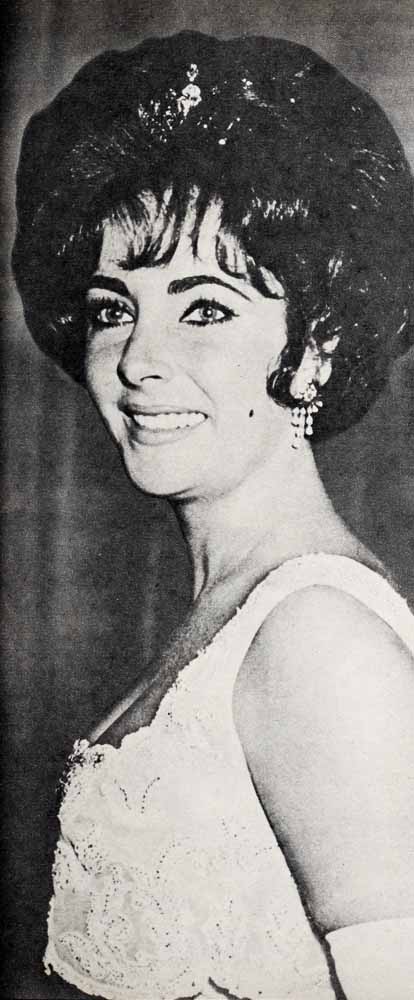
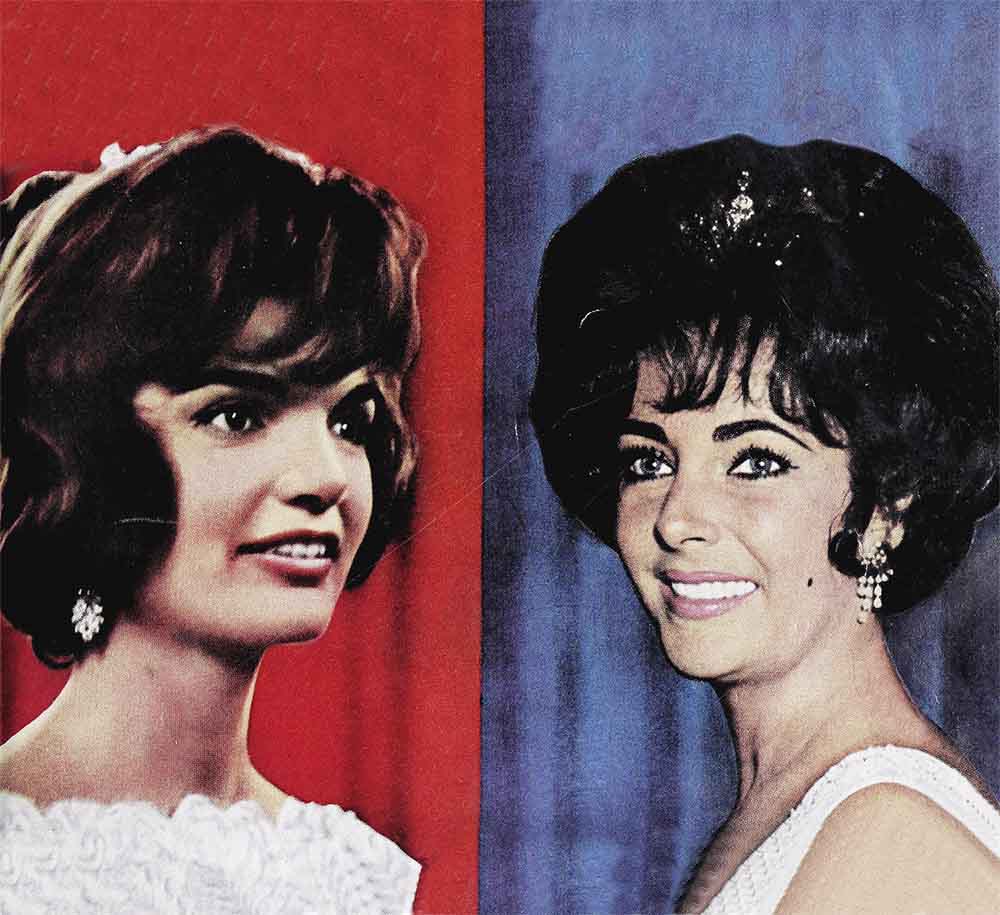

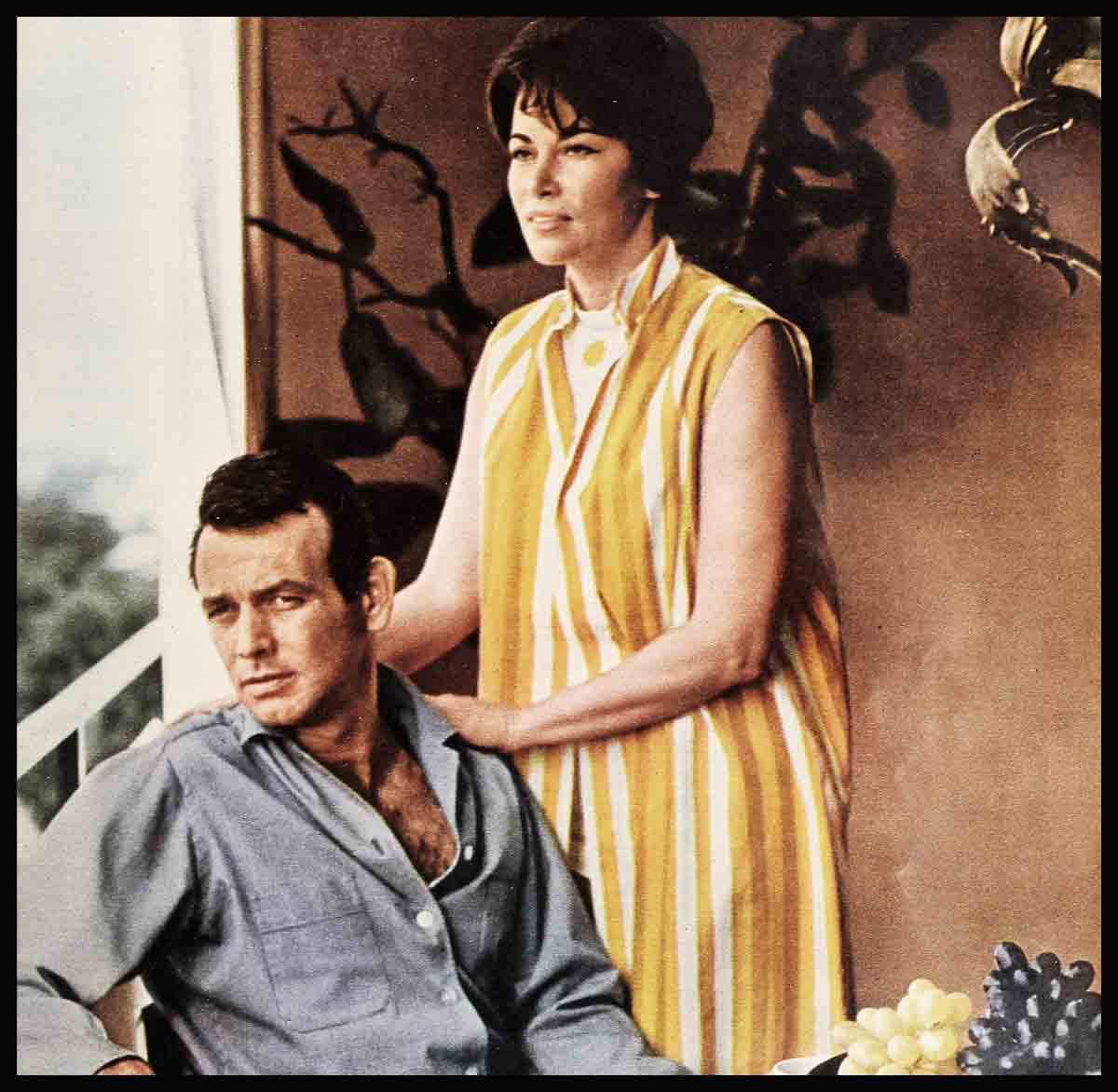

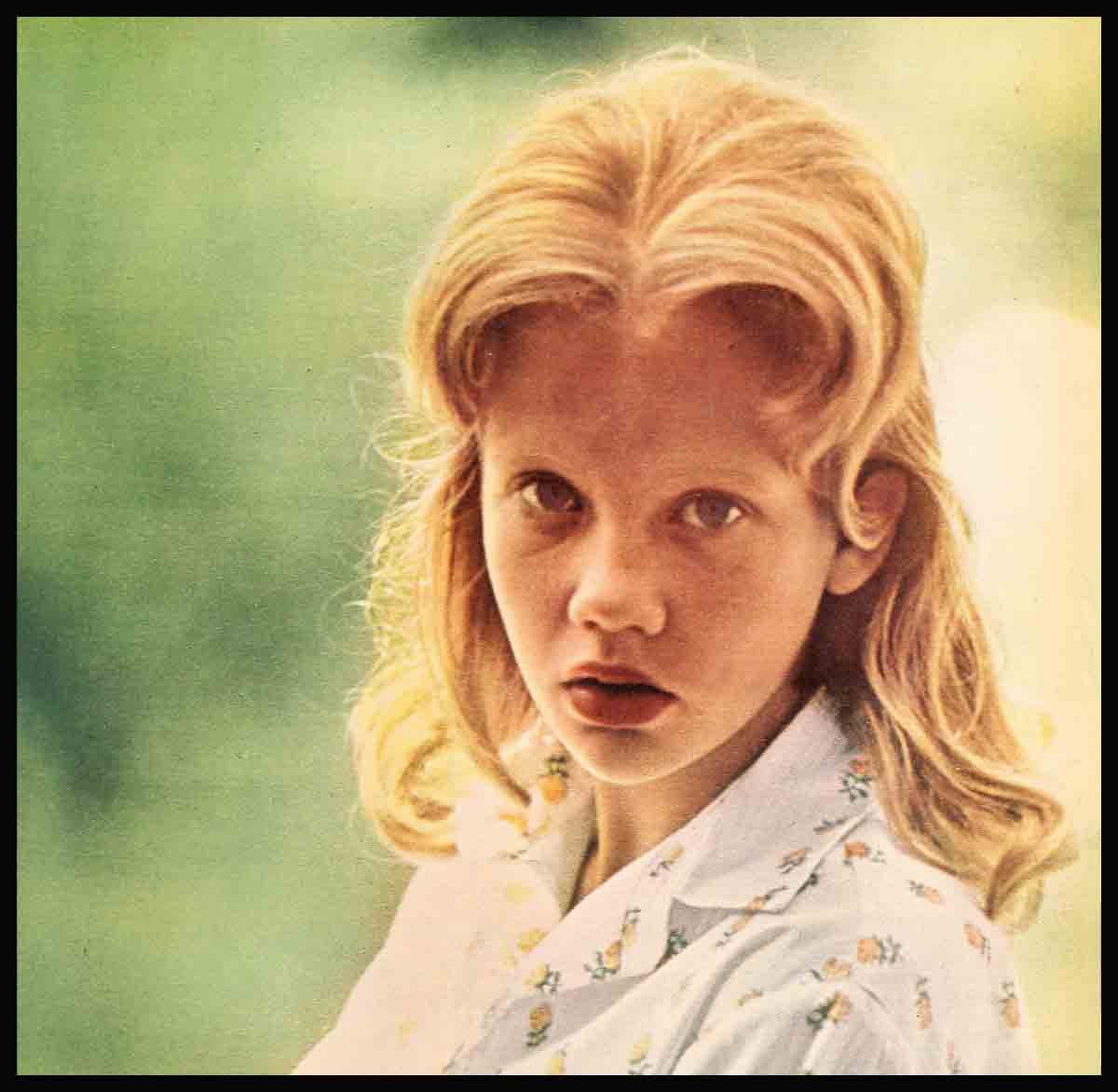
No Comments